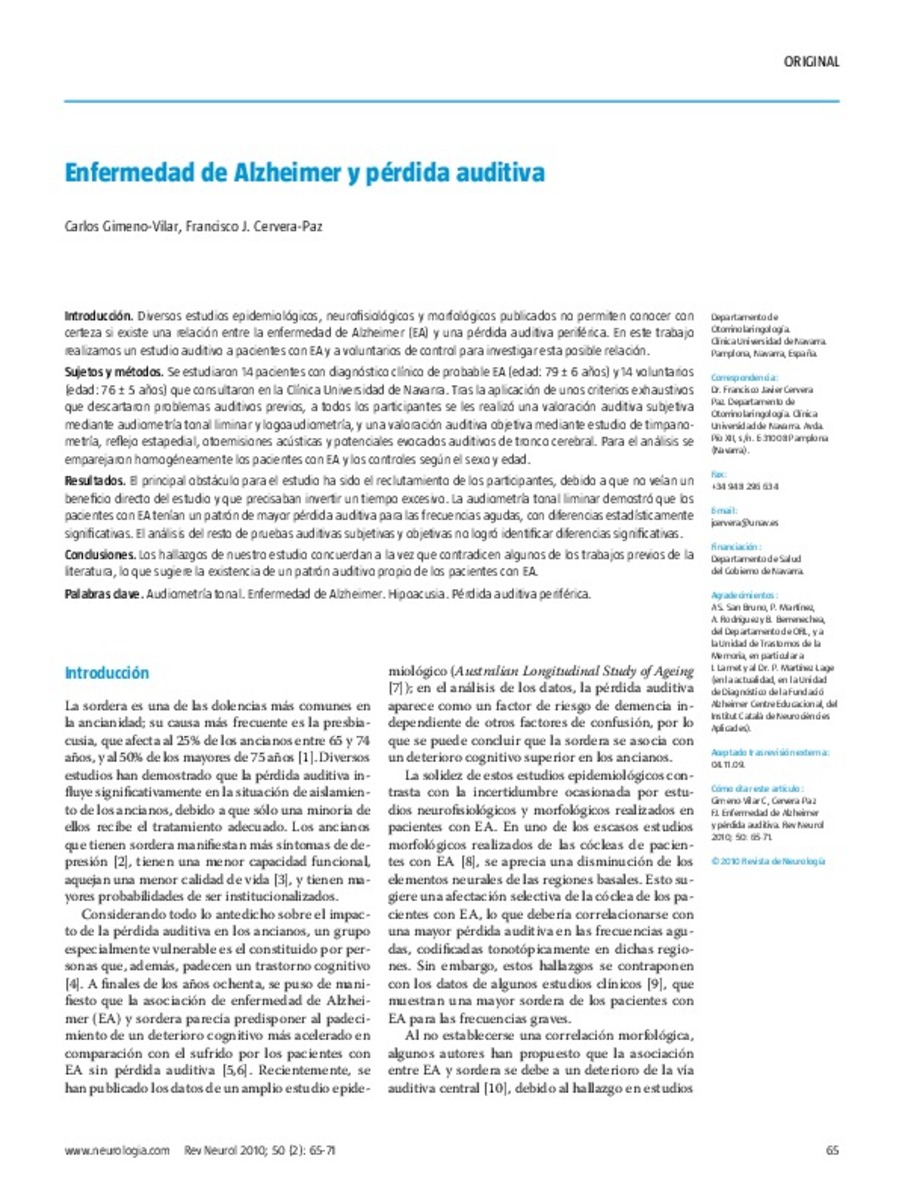Full metadata record
| DC Field | Value | Language |
|---|---|---|
| dc.creator | Gimeno-Vilar, C. (Carlos) | - |
| dc.creator | Cervera-Paz, F.J. (Francisco J.) | - |
| dc.date.accessioned | 2012-07-03T07:29:49Z | - |
| dc.date.available | 2012-07-03T07:29:49Z | - |
| dc.date.issued | 2010 | - |
| dc.identifier.citation | Gimeno-Vilar C, Cervera-Paz FJ. Enfermedad de Alzheimer y pérdida auditiva. Rev Neurol 2010 Jan 16-31;50(2):65-71. | es_ES |
| dc.identifier.issn | 0210-0010 | - |
| dc.identifier.uri | https://hdl.handle.net/10171/22779 | - |
| dc.description.abstract | Despite the different epidemiological, neurophysiological and morphological studies published in the literature, it is still not known for sure whether there is a relation between Alzheimer's disease (AD) and peripheral hearing loss. In this work we conduct an auditory study in patients with AD and in volunteer controls in order to investigate this possible relationship. SUBJECTS AND METHODS: The sample studied consisted of 14 patients with a clinical diagnosis of probable AD (age: 79 Y 6 years) and 14 volunteers (age: 76 Y 5 years) who visited the Clinica Universidad de Navarra. After applying a set of thorough criteria to preclude any previous hearing problems, all the participants underwent a subjective hearing assessment by means of pure-tone threshold audiometry and vocal audiometry and an objective auditory assessment using a tympanometry study, stapedial reflex, otoacoustic emissions and brainstem auditory evoked potentials. For the analysis, patients with AD and controls were paired homogenously by sex and age. RESULTS: The main obstacle hindering the study was to recruit the participants, due to the fact that they did not see any direct benefit from the study and it demanded an excessive amount of their time. Pure-tone threshold audiometry showed that patients with AD had a pattern of greater hearing loss for acute frequencies, with statistically significant differences. No significant differences were found in the analysis of the rest of the subjective and objective hearing tests. CONCLUSIONS: The findings of our study both agree and disagree with some earlier works from the literature, which suggests that patients with AD may have their own auditory pattern | es_ES |
| dc.language.iso | spa | es_ES |
| dc.publisher | Viguera | es_ES |
| dc.rights | info:eu-repo/semantics/openAccess | es_ES |
| dc.subject | Alzheimer Disease/physiopathology | es_ES |
| dc.subject | Audiometry, Pure-Tone | es_ES |
| dc.subject | Evoked Potentials, Auditory, Brain Stem/physiology | es_ES |
| dc.title | Enfermedad de Alzheimer y pérdida auditiva | es_ES |
| dc.type | info:eu-repo/semantics/article | es_ES |
| dc.relation.publisherversion | http://www.neurologia.com/pdf/Web/5002/bd020065.pdf | es_ES |
| dc.type.driver | info:eu-repo/semantics/article | es_ES |
Files in This Item:
Statistics and impact
Items in Dadun are protected by copyright, with all rights reserved, unless otherwise indicated.






